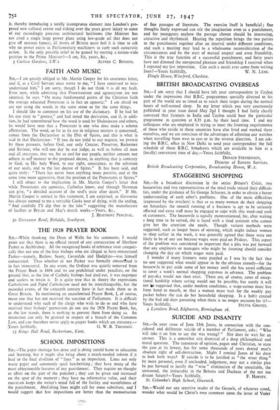SCHOOL IMPOSITIONS
SIR,—The paper shortage has done and is doing untold harm to education and learning,• but it might also bring about a much-needed reform if it lead to the final abolition of " lines " as an imposition. Lines not only waste paper and commonly spoil handwriting ; they have many of the most objectionable features of any punishment. They require no thought or effort on the part of the punisher ; they can be given and increased on the spur of the moment ; they have no reformative value, and their execution keeps she writer's mind full of the futility and wastefulness of the punishment. Abolishing lines might call for some substitute, and I would suggest that few impositions are better than the memorisation
of fine passages .of literature. The exercise itself is beneficial ; fine thoughts finely expressed can stir the imagination even as a punishment, and for youngsters anyhow the passage chosen should be interesting, attractive and rhythmical. Hearing the repetition brings the two parties to the punishment together after an interval under different conditions, and such a meeting may lead to a wholesome reconsideration of the circumstances and be the start of mutual respect and even friendship. This is the true function of a successful punishment, and forty years have not dimmed the unexpected pleasure and friendship I received when I repeated my last imposition. Can such a result ever tome from writing
lines?—Yours faithfully, W. N. LEAK. Dingle House, Wins ford, Cheshire.


































 Previous page
Previous page